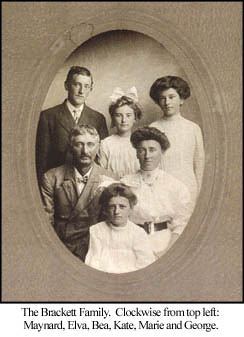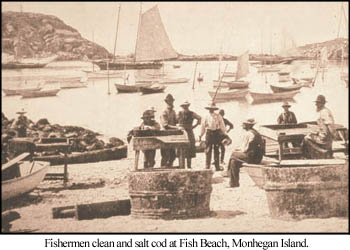|
|

 A native and resident of Monhegan Island and a descendent of nine generations that have been living and fishing here since the late 1700s, I am directly related to some of the original families that settled Monhegan–the Trefethens, the Starlings, and the Bracketts. The sea stories of my lobster fishing ancestors and mentors have inspired me in my personal quest to achieve "highliner" goals. For me, fishing continues to be a vital way of life and a persistent passion. A native and resident of Monhegan Island and a descendent of nine generations that have been living and fishing here since the late 1700s, I am directly related to some of the original families that settled Monhegan–the Trefethens, the Starlings, and the Bracketts. The sea stories of my lobster fishing ancestors and mentors have inspired me in my personal quest to achieve "highliner" goals. For me, fishing continues to be a vital way of life and a persistent passion.
For generations, my family has led a double life, dividing their time between fishing and running the Monhegan House, a popular resort on Monhegan Island. In both worlds, the people I have met have become part of my extended family as I developed to become a commercial fishing professional.
More than a hundred years ago brave sea-faring captains dared to carve a living from the sea and claimed a year-round home on a one-mile island rock. My great-great-grandfather George "Cass" Brackett, a prominent sea captain on Monhegan’s Fish Beach (headquarters to the Monhegan fishing fleet), was the most enterprising of my ancestors. His entrepreneurial spirit led the family into diverse businesses, from fishing to the chartering of passengers to and from the mainland.
Elva Brackett, Cass’s daughter and my great-grandmother, carried on the tradition of independence at the helm of her many island businesses by becoming the owner and operator of the Monhegan House, a postmaster,
a photographer, and owner of a general store. She had strong goals for
herself and the community. My great-grandfather Chris Nicholson was a spirited character. Strong and full of energy, he worked as a lobster fisherman, a tub trawler, and a rumrunner during prohibition. He had a sense of adventure and loved a good party.
Each lobster fishing generation would begin Monhegan’s unique winter lobster season (December 1–May 29) with a mix of hopes and fears. They hoped for the "big catch" and a high market price, and feared the disappointing losses that could result from boat breakdowns during a short harvest season. All of my ancestors danced with danger at sea. Rough seas and cold winter weather were the norm, but each fisherman was prepared to meet any challenge with a readiness for action.
Times have changed. Fishing boats, once constructed of wood, are now made of fiberglass, and old-fashioned wooden lobster traps weighed down with stones have given way to heavy wire traps. But some things never change: fishermen still paint the buoys, overhaul the lines, and prepare the traps. And above all, sea captains continue to have a passion for the ocean and for the fishing way of life.

|
|



